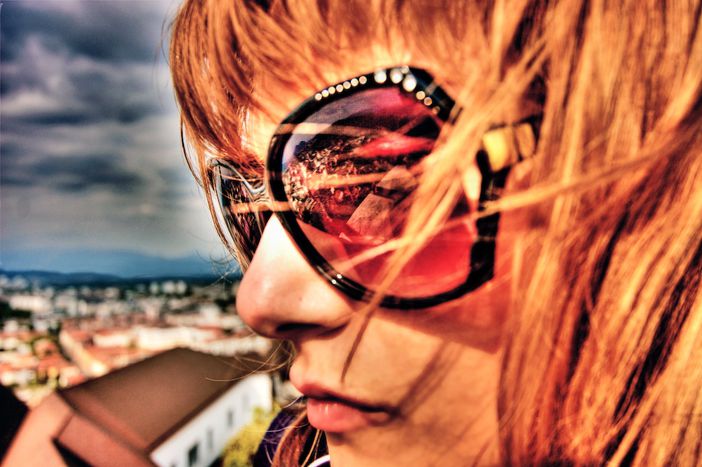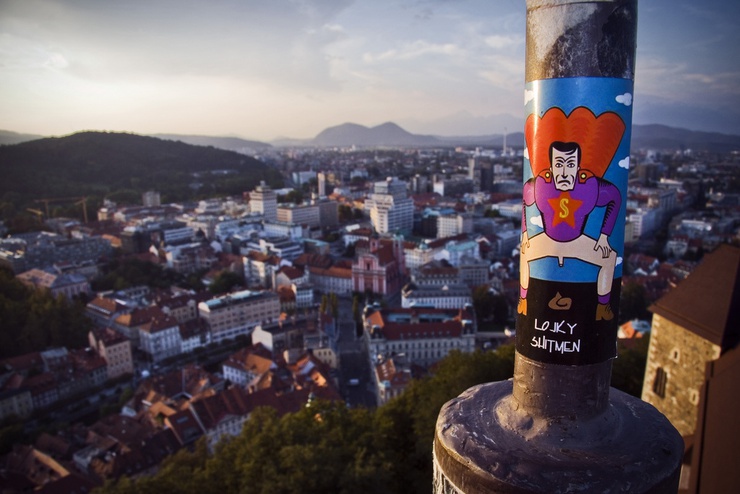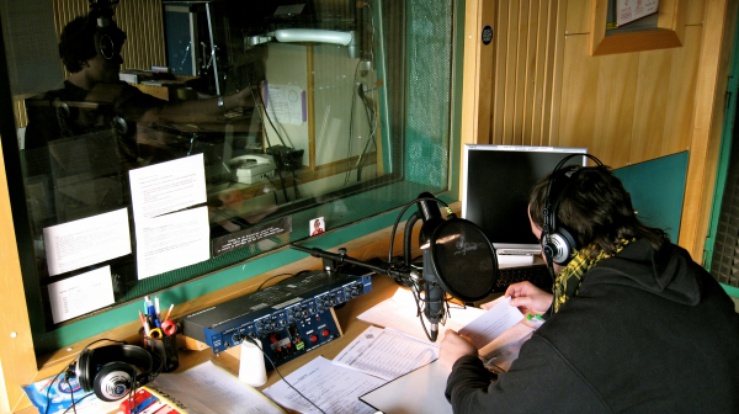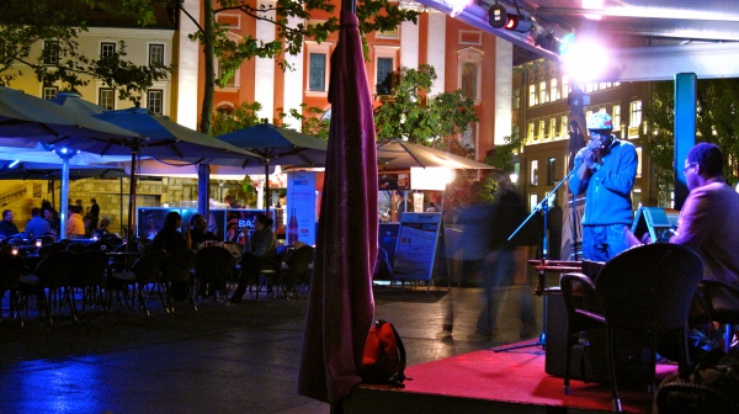
Multicultural Slovenia: where did the minorities go?
Published on
Translation by:
Sara CalderIn Slovenia, day-to-day interactions are fragmented. Casting aside the singular identity does not always imply the creation of multiple, different identities, but rather the birth of a dual identity: the idea of you and I, rather than them. This duality is among one of the first things you learn about on arrival in Ljubljana
During its twenty-one years as an autonomous republic, Slovenia’s policy towards foreigners has neglected to integrate its various ethnic and cultural minorities. The nationalistic ideology that once served to strengthen the foundations of the state has paved the way for discrimination and fragmentation within the country. In the capital, several external voices are bringing forward-thinking ideas to the table to break down the barriers between ‘us’ and ‘them'.
Indigenous vs economic
‘They say that Slovene is a romantic language, because the word ‘love’ can be expressed in the dual form. It is one of only a few languages that have retained this feature,’ states the guide handed out to visitors in the city’s tourist information office. Over two decades after gaining independence from Yugoslavia on 25 June 1991, Slovenia has integrated into the western world: it joined the EU in 2004 and adopted the single currency in 2007, and now even hands out the same kind of bloated tourist paraphernalia found in other European cities.

‘There are still many communists in power. They are responsible for promoting multiculturalism in Slovenia,’ claims Zmago Jelinčič Plemeniti somewhat irritably. The leader of the extreme Slovenian nationalist party, Slovenska nacionalna stranka (SNS), sits at his headquarters. With a modest population of two million, numerous minority groups reside in the country: in 2011, Italians accounted for 0.11% of Slovenia’s population, while Serbs represented 2%. Therefore, it is surprising that only a select few minorities are protected under Slovenian legislation. ‘The Italians and Hungarians are recognised under the constitution as they are indigenous, whereas others - mainly the Serbs, Croats, Macedonians, Albanians and Montenegrins - are not. They came to Slovenia for economic reasons,’ says Jelinčič.
Presidents and minorities
En route to the university of Ljubljana’s social sciences department, noise blares from two speakers placed on top of a car in the traffic. The traditional Slovenian music is accompanied by a thundering sermon; Borut, a young journalist, explains that these protesters are criticising the government of Danilo Türk in a bid to stir up nationalistic sentiments (the current president enjoys support from the left). Translating in between sips of his coffee, Borut appears to not think any more of it.
Danilo Türk currently polls favourably to resume his role in Slovenia’s presidential elections on 11 November. However, apart from a few impromptu gatherings with protestors using megaphones, one would not even notice that an election is imminent. ‘This type of demonstration is not common, the Slovenians are generally a reserved people,’ smiles Milan Brglez, an expert in international relations at the university of Ljubljana. He says that Slovenia has failed to grasp the concept of multiculturalism, but all is not lost. ‘In a way, our society is still distrustful of the unfamiliar. Even so, I do not get the impression that xenophobia is on the rise. Nationalism does exist, but only as a means of preserving a Slovenian national identity.’
After gaining independence, it was vital to nurture nationalistic ideology within the newly-created Slovenian state to allow the country to survive and develop. However, the creation of a national identity ended up creating the divide between ‘us’ (in this case, the Slovenians), and ‘them’ (the minorities). Matija, a presenter on the alternative broadcaster Radio Študent, gives several examples of this. ‘’Južnjaki’ means ‘southern’, although it is not pejorative,’ he explains. ‘‘Čefur’ is an insult that is used nowadays to describe those who were Yugoslavs from the southern states.’ Even the simple act of calling someone Bosnian is seen as an insult.

Located in Rožna dolina, Ljubljana’s main student residence complex, Radio Študent often turns the microphone over to Slovenia’s minorities among other things. ‘We have programmes produced by the different minority groups living here. For example, This is Africa (‘Tu je Afrika’) is produced by Africans living in Ljubljana. There is also Gypsy Future (‘Romano Anglunipe’) and Subalpine Greetings (‘Podalpski selam’), which is made by a group of Bosnians. Visa for the Future (‘Viza za budućnost’) aims to help and give visibility to immigrant workers,’ explains Matija.
Erased
However, in a country where citizens of other Yugoslav republics were literally erased, creating a sense of ‘otherness’ was conceived as a simple and straightforward exercise. ‘After the referendum in favour of independence in December 1990, those who remained living in Slovenia but who had a passport from another Yugoslav republic lost their residence rights in Slovenia,’ explains Neža Kogovšek Šalamon, director of the capital’s Peace institute for contemporary social and political studies (Mirovni inštitut). Around 200, 000 people, or 10% of the population, were from other parts of Yugoslavia. 25, 671 of these people, known as izbrisani (erased), were removed from the country’s registry of permanent residence. They also lost all political, civil and legal rights, including the right to live in Slovenia - today, only half have had their residencies reinstated.
'The Balkans was treated as an enemy: a kind of fifth column. Slovenia acted against any person from there'
Was this a case of Slovenia seeking revenge? ‘It was clearly an act of discrimination by the state,’ agrees Milan Brglez. ‘The Balkans was treated as an enemy: a kind of fifth column. Slovenia acted against any person from there.’ Slovenia deliberately made laws that would leave these people high and dry, making it clear that they were outsiders, ignoring any concept of the famous Slovenian duality. In front of the bust of Tito that presides over the garden, Zmago Jelinčič Plemeniti adds with an air of nostalgia that under the dictatorship, there were no problems between the republics. The remission of the 172 million euros debt that Slovenia is asking of Croatia in return for not blocking its accession to the European Union (so far 14 EU members plus Croatia have ratified Croatia's entry into the EU in July 2012 - ed) confirms the bilateral tensions that still exist in the Balkans.

Once seen as the most dominant political ideology over the last two centuries, nationalism now threatens the future of Slovenia. ‘Xenophobia in the country may not be increasing, but it is certainly latent,’ says Neža Kogovšek Šalamon. Near Ljubljana’s famous Triple Bridge, two musicians from Burkina Faso are playing music across from a bar. People pass by, while on the large nearby terrace, perhaps six people are watching. The two young men are asked to stop as the owner of the bar reprimands them for speaking in French between songs: ‘No one understands you! Slovene and English only, is that clear?’ The pair continues to play their music, seemingly deaf towards the intolerance that surrounds them.
This article is part of the tenth and final edition in cafebabel.com’s 2012 feature focus series on 'MultiKulti' aka 'multiculturalism in Europe'. Many thanks to the team at cafebabel.com Ljubljana
Images: main (cc) CyberAndy/ Andrea Volpini/ flickr; in-text graffiti (cc) smif/ flickr; all others (cc) Jorge Mallén/ video (cc) granatna/ youtube
Translated from Eslovenia en la encrucijada: “nosotros” contra “ellos”



